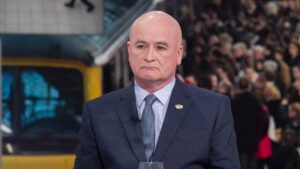
The leader of the Rail, Maritime and Transport union has warned that strikes set to cripple Britain’s railways could last for a “very, very long time”.
Members of the RMT at Network Rail and 13 train operators overwhelmingly backed industrial action in a ballot last week.
The dates of the strikes — billed as the biggest in modern history — are expected to be announced this week and could begin as soon as mid-June.
Rail bosses are drawing up plans to keep supermarket shelves stocked by giving freight trains priority over passenger services. Fears have been raised that staff walkouts could lead to much of the rail network being closed.
Mick Lynch, RMT general secretary, stoked fears of long-lasting disruption yesterday as he warned that he “cannot see a way out from the strikes”.
He told Sky’s Sophy Ridge On Sunday programme: “They could go on for a very, very long time. There is no sign at the moment that anybody is backing down on their side of the table.”
He could not say how much disruption the union action may cause, but added: “We will decide that if it happens. We want to make the strike action as effective as possible from our point of view.
“Our members are prepared to take effective strike action in pursuit of the settlement of this dispute. I have got no idea how long that will take and I can’t determine from here what the outcomes and side effects of that will be.”
Asked if a strike was inevitable, Lynch said: “At the moment unless there is a breakthrough and the government instructs these companies — which they are doing — to change their line rather than harden their line it is very, very likely there will be.”
The proposed strike, which threatens both Network Rail, the manager of the tracks, and train operators, is over pay, redundancies and a demand for “a guarantee that there will be no detrimental changes to working practices”.
At least 2,500 maintenance jobs at Network Rail are due to be cut as the industry seeks to cut costs. The unions are demanding double-digit pay rises in line with inflation, even though fewer passengers are using the railways than before the pandemic.
The Treasury injected £16 billion into the industry to support it during the pandemic.
Wendy Morton, the rail minister, has insisted that rail workers have already received greater pay increases in the past decade than teachers, nurses, firefighters and ambulance crews.
She has also warned that industrial action threatened to undermine attempts to modernise the sector.
On Tuesday, Baroness Vere, the transport minister, said it was “very important that we try and prioritise rail freight wherever we can because it’s very important to supply chains”.
Freight operators are holding discussions with Network Rail about the potential impact of strikes by its signallers.
It is possible that about 80 per cent of services will be cut, with trains running for only part of the day and only on main lines.
The government and rail firms have previously criticised the move, calling it “hugely disappointing and premature”, and warning the action could affect the rail industry’s recovery from the damage caused by coronavirus.
The union will have to give two weeks’ notice before strikes.
Read more:
Rail strike to last ‘a very, very long time’, says union chief Mick Lynch




